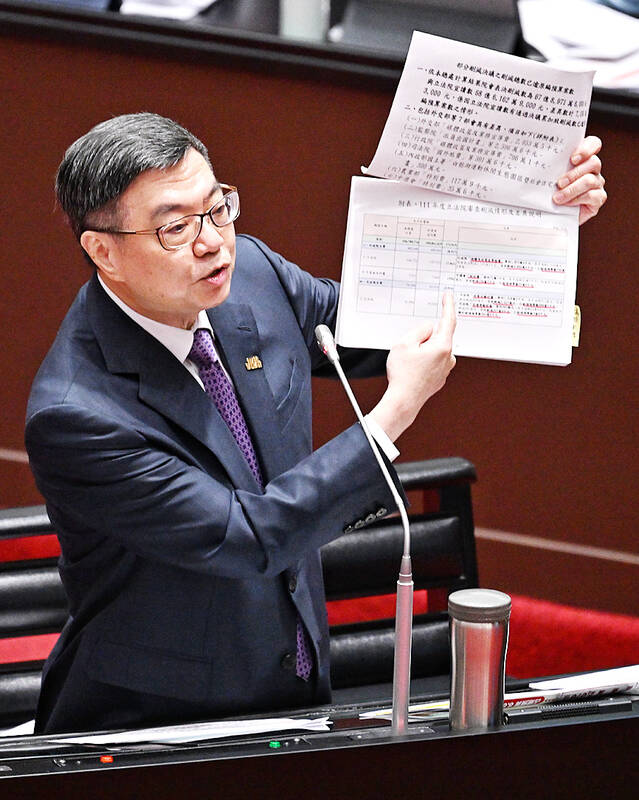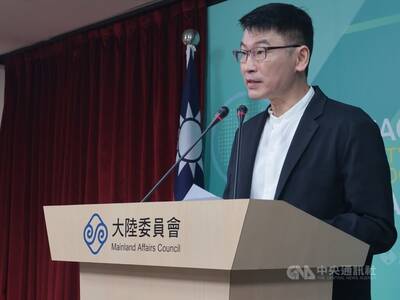The Democratic Progressive Party (DPP) yesterday said it plans to hold eight public briefings from Saturday, after the Legislative Yuan concludes its ongoing reconsideration of the general budget and budget allocation measures.
Lawmakers convened yesterday to redeliberate this year’s budget, and are to meet today to discuss amendments to the Act Governing the Allocation of Government Revenues and Expenditures (財政收支劃分法).
The Cabinet had returned the budget and the amendments the legislature for a revote, saying that the changes would be difficult to implement.

Photo: Liu Hsin-de, Taipei Times
The DPP meetings would be led by Premier Cho Jung-tai (卓榮泰) and his team, along with local lawmakers and industry representatives.
To inform people of how they might be affected by proposed budget cuts, the DPP is to hold a briefing in each of the six special municipalities, as well as Hsinchu and Hualien counties, it said.
DPP Organization Department chairman Chang Chih-hao (張志豪) yesterday convened a coordination meeting with local party officials to finalize briefing plans, sources said.
DPP Secretary-General Lin Yu-chang (林右昌) is expected to announce the detailed schedule today after the party’s Central Standing Committee meeting.
The briefings would focus on how budget cuts would damage people’s livelihoods, with events on Saturday in Taichung, in Taoyuan on Sunday, in Taipei and Hualien County on Saturday next week, in Tainan on March 23 and the final meeting in New Taipei City on March 30, a source said.
The first three locations are home to major civil society recall efforts targeting Chinese Nationalist Party (KMT) lawmakers.
The goal of the meetings is to help the public understand the impact of budget cuts, rather than support recall campaigns, said Chen Chia-hsing (陳嘉行), executive director of the DPP’s Taipei chapter.
However, given that more than 30 recall campaigns targeting KMT lawmakers have passed the first stage, some within the DPP worry momentum might start to decrease, Chen said.
It is a good thing that the party is to provide the public with a unified message, and these events would draw thousands of people, he added.
Speaking at the Legislative Yuan meeting yesterday, Cho said it is the government’s responsibility to explain to the public how the budget cuts would affect them.
“There is no way to achieve our expected goal,” he said about the slashed budget.
Cho said he hoped that the legislature would reconsider the budget cuts during this week’s discussions.
The cuts are more than six times and funds frozen more than nine times than the average over the past three years, with some agencies and programs already feeling the effects, he said.
Hopefully, “rational conversation” can continue, Cho said.
There is also difficulty in unfreezing budgets, he added.
Most funds would remain frozen until November or December, making them inaccessable for most of the year, he said, citing Directorate-General of Budget, Accounting and Statistics data.
Regarding the legislature’s decision to cut NT$100 billion (US$3.04 billion) from Taiwan Power Co’s budget, Cho said the nation would have to take on debt and raise electricity rates as a result, which would harm people’s livelihood and make Taiwan’s industry uncompetitive.

ENDORSING TAIWAN: Honduran presidential candidate Nasry Afura said that Honduras was ‘100 times better off’ when it was allied with Taipei The Ministry of Foreign Affairs yesterday said it would explore the possibility of restoring diplomatic relations with Honduras based on the principle of maintaining national interests and dignity. The ministry made the remarks in response to reporters’ questions regarding an article titled: “Will Taiwan Regain a Diplomatic Ally?” published in The Diplomat on Saturday. The article said Honduras’ presidential election in November could offer Taiwan the chance to regain an ally, as multiple candidates have promoted re-establishing diplomatic relations with Taiwan. Honduras severed diplomatic ties with Taiwan in March 2023 in favor of Beijing, but since switching its diplomatic recognition,

A fourth public debate was held today about restarting the recently decommissioned Ma-anshan Nuclear Power Plant, ahead of a referendum on the controversial issue to be held in less than two weeks. A referendum on Aug. 23 is to ask voters if they agree that “the Ma-anshan Nuclear Power Plant should continue operations upon approval by the competent authority and confirmation that there are no safety concerns.” Anyone over 18 years of age can vote in the referendum. The vote comes just three months after its final reactor shut down, officially making Taiwan nuclear-free. Taiwan People’s Party Chairman Huang Kuo-chang (黃國昌) represented

Scoot announced yesterday that starting in October, it would increase flights between Taipei and Japan’s Narita airport and Hokkaido, and between Singapore and Taipei. The low-cost airline, a subsidiary of Singapore Airlines, also said it would launch flights to Chiang Rai in Thailand, Okinawa and Tokyo’s Haneda airport between December and March next year. Flights between Singapore and Chiang Rai would begin on Jan. 1, with five flights per week operated by an Embraer E190-E2 aircraft, Scoot said. Flights between Singapore and Okinawa would begin on Dec. 15, with three flights per week operated by Airbus A320 aircraft, the airline said. Services between Singapore

The Mainland Affairs Council (MAC) yesterday announced a ban on all current and former government officials from traveling to China to attend a military parade on Sept. 3, which Beijing is to hold to mark the 80th anniversary of the end of the Second Sino-Japanese War. "This year marks the 80th anniversary of the end of World War II and the Republic of China’s victory in the War of Resistance [Against Japan]," MAC Deputy Minister and spokesperson Liang Wen-chieh (梁文傑) told a regular news briefing in Taipei. To prevent Beijing from using the Sept. 3 military parade and related events for "united